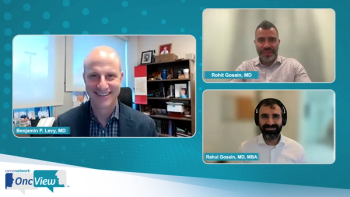
Panelists discuss how ongoing trials may reshape the treatment landscape for HER2-altered NSCLC, particularly regarding the roles of ADCs and TKIs in managing both HER2-mutated and HER2-overexpressing NSCLC.

Your AI-Trained Oncology Knowledge Connection!


Panelists discuss how ongoing trials may reshape the treatment landscape for HER2-altered NSCLC, particularly regarding the roles of ADCs and TKIs in managing both HER2-mutated and HER2-overexpressing NSCLC.

Risk factors and biomarker testing in conjunction with cancer staging may better identify ideal treatment for endometrial cancer than cancer staging alone.

Panelists discuss how ongoing trials may reshape the treatment landscape for HER2-altered NSCLC, particularly regarding the roles of ADCs and TKIs in managing both HER2-mutated and HER2-overexpressing NSCLC.

Panelists discuss how the evolving treatment landscape for HER2-overexpressing NSCLC, particularly with the introduction of trastuzumab deruxtecan, influences therapeutic strategies and decision-making based on recent clinical trial data.

Panelists discuss how the interpretation of HER2 IHC scores informs treatment decisions in NSCLC, including adherence to ASCO/CAP guidelines and strategies for managing equivocal results.
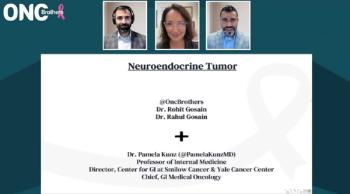
Panelists discuss how next-generation sequencing can identify actionable mutations and molecular alterations in neuroendocrine tumors, potentially guiding personalized treatment decisions and clinical trial eligibility while advancing our understanding of tumor biology.

Panelists discuss how treatment selection for well-differentiated grade 3 neuroendocrine tumors requires careful consideration of factors including Ki-67 index, tumor biology, and disease progression rate to determine whether platinum-based chemotherapy or targeted therapies are most appropriate.

Panelists discuss how somatostatin analogues, while effective in controlling hormone-related symptoms and tumor growth in neuroendocrine tumors, face challenges including drug resistance, optimal dosing strategies, and timing of initiation in the treatment sequence.

Panelists discuss how accurate grading and classification of neuroendocrine tumors is crucial for determining prognosis and treatment strategies, focusing on key histopathological features.

Panelists discuss how understanding the distinctions between HER2 overexpression and mutations in NSCLC influences patient care strategies and prognosis, alongside the challenges of biomarker testing methods such as IHC and NGS.
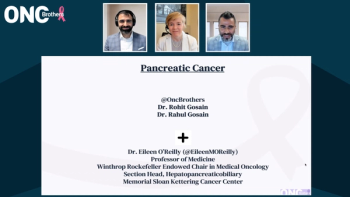
With Eileen O’Reilly, MD, the Oncology Brothers discuss the current treatment paradigm for early-stage pancreatic cancer, focusing on diagnostic strategies, surgical options, and adjuvant therapies to improve patient outcomes.

With Eileen O’Reilly, MD, the Oncology Brothers discuss treatment considerations for resectable pancreatic cancer, including criteria for surgical resection, the role of adjuvant therapies, and strategies to optimize patient outcomes post surgery.

With Eileen O’Reilly, MD, the Oncology Brothers discuss the treatment paradigm for metastatic pancreatic cancer, covering systemic therapies, the role of targeted treatments, and strategies for managing disease progression and improving quality of life.

With Eileen O’Reilly, MD, the Oncology Brothers discuss treatment considerations for disease progression in pancreatic cancer, focusing on the management of refractory disease, shifting therapeutic strategies, and optimizing patient care in advanced stages.

With Eileen O’Reilly, MD, the Oncology Brothers discuss the essential steps in the initial workup for a newly diagnosed pancreatic cancer patient, including clinical evaluation, imaging, biopsy, and multidisciplinary staging for treatment planning.
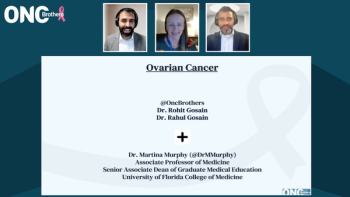
With Martina Murphy, MD, collaborates with the Oncology Brothers to explore personalized treatment strategies for ovarian cancer, emphasizing dose reduction and the management of adverse effects to enhance patient care and outcomes.

With Martina Murphy, MD, the Oncology Brothers discuss maneuvering through different treatment options for ovarian cancer, emphasizing the need for personalized approaches to optimize patient care and outcomes.

With Martina Murphy, MD, the Oncology Brothers discuss maintenance therapies in ovarian cancer, focusing on their potential to prolong progression-free survival and improve quality of life for patients.

With Martina Murphy, MD, the Oncology Brothers discuss the role of adjuvant chemotherapy in early-stage endometrioid and clear cell ovarian cancer, highlighting its impact on improving patient outcomes and the importance of tailored treatment strategies.

With Martina Murphy, MD, the Oncology Brothers discuss the latest advancements in the diagnosis and treatment of epithelial ovarian, fallopian tube, and primary peritoneal cancers, emphasizing the importance of a multidisciplinary approach for optimal patient outcomes.
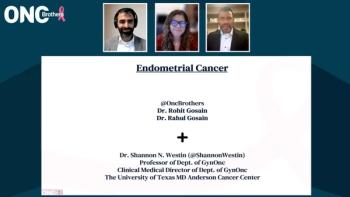
Shannon N. Westin, MD, discusses chemotherapy options for endometrial cancer as well as the results of her phase 3 DUO-E trial.

Shannon N. Westin, MD, discusses how patient considerations for immunotherapy treatment involve evaluating individual health profiles, potential adverse effects, and the importance of personalized approaches to enhance treatment efficacy and patient quality of life.

Shannon N. Westin, MD, discusses how neoadjuvant treatment considerations for endometrial cancer can improve surgical outcomes and patient prognosis through the use of personalized, multidisciplinary approaches tailored to individual tumor characteristics.

Shannon N. Westin, MD, discusses the molecular classification of endometrial cancer.

Shannon N. Westin, MD, provides an overview of endometrial cancer to the Oncology Brothers.
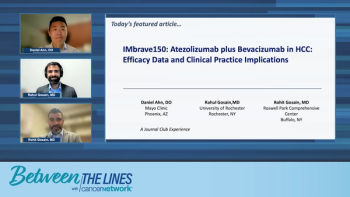
Key opinion leaders summarize essential takeaways and highlight unmet needs in the hepatocellular carcinoma treatment landscape.

The panel reviews the CheckMate 9DW study design and evaluates its safety data.

Key opinion leaders examine IMbrave 150 data stratified by baseline varices and compare outcomes between patients with Child-Pugh A and B.

Medical experts analyze the exploratory efficacy and safety results for patients with portal vein invasion (Vp4), addressing the challenges in treating this subgroup.

Key opinion leaders share their impressions of the IMBrave150 trial data and discuss their real-world clinical experiences using atezolizumab plus bevacizumab in practice.